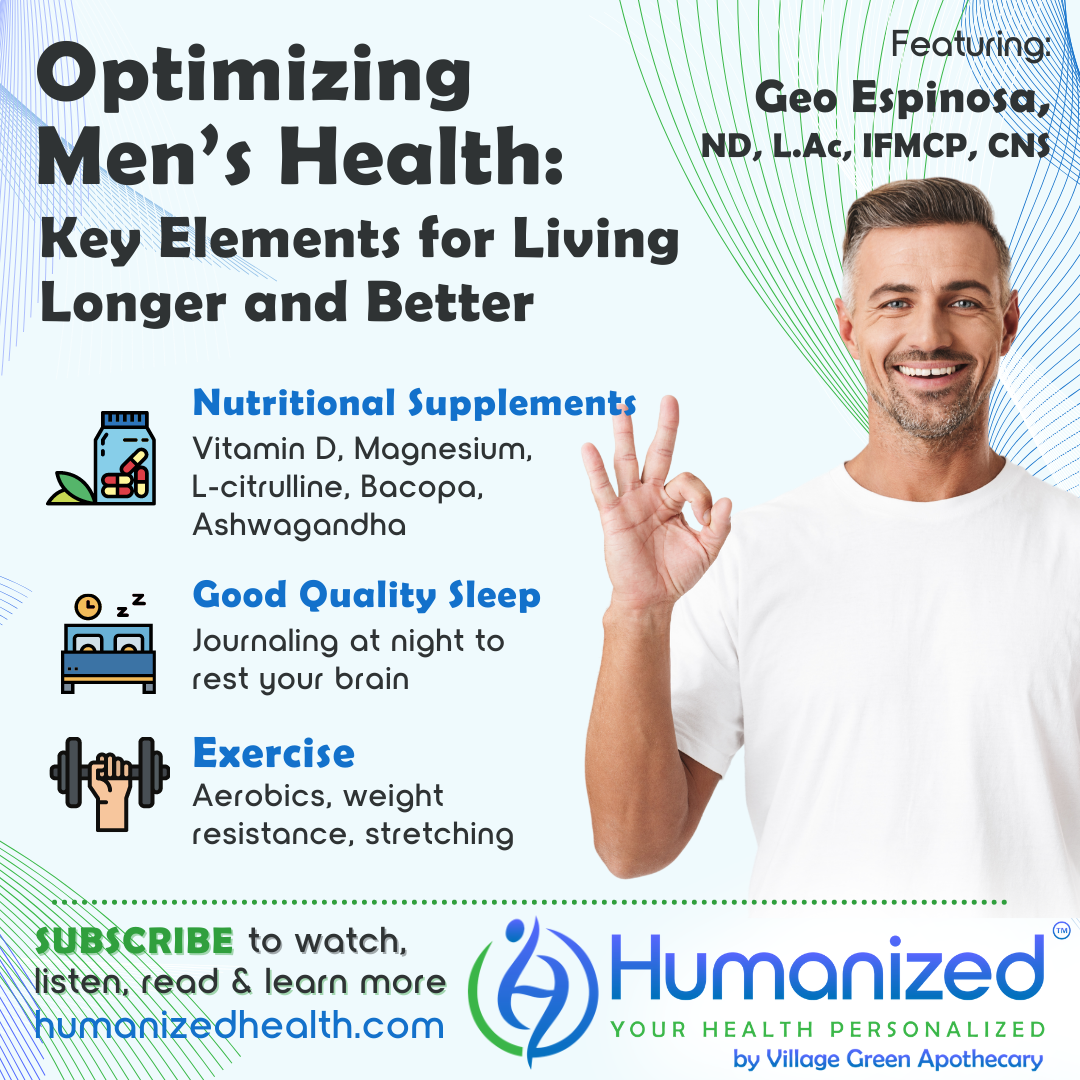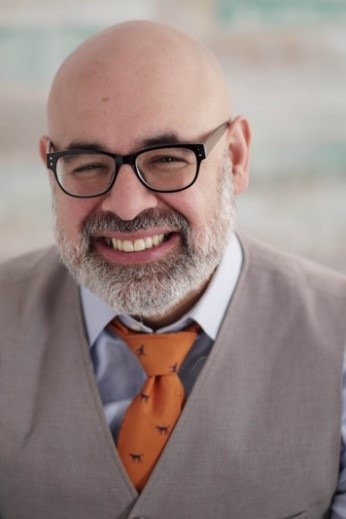Optimizing Men’s Health
Featuring
Geo Espinosa ND, L.Ac, IFMCP, CNS
WATCH
LISTEN
READ
David Stouder: Welcome to the Humanized Podcast. Thanks for being here. I’m your host, Dave Stouder. Our topic today is “Optimizing Men’s Health.” We have the perfect guest for that, Dr. Geo Espinosa.
Before I introduce Dr. Geo, I want to remind you to subscribe, to get all of our variety of casts: audio, video and transcription at HumanizedHealth.com. I’d also like to thank our lead sponsor, Village Green Apothecary at MyVillageGreen.com.
I’ll tell you a little bit about Dr. Geo Espinosa. He’s a naturopathic, functional medicine doctor recognized as an authority in urology and men’s health. Dr. Geo is an avid researcher and writer and has authored numerous scientific papers and books. He is faculty at New York University Langone Health, and faculty at the Institute of Functional Medicine.
Dr. Geo lectures internationally on the application of science-based, holistic treatments for urological conditions. He’s also authored and co-authored a couple of books. I like the title of this, Dr. Geo: Thrive, Don’t Only Survive: Dr. Geo’s Guide to Living Your Best Life Before and After Prostate Cancer. He also co-authored Integrative Sexual Health.
Welcome to the program. I see so many commercials, Dr. Geo, reminding we aging men that we are aging, we’re losing our drive, we’re losing our testosterone, etc., etc. How would you put anti-aging into perspective? What’s your definition?
Dr. Geo Espinosa: We will all have to age. I think what we’re trying to accomplish is how to age successfully, not to NOT age. What we’re trying to do is not get old. We should age, but not get old. There are things to do to make that to happen. It’s not going happen by itself. It’s not going happen by being sedentary. If we do the work, we are going to be able to play this sport called life well and at a high level.
Anti-aging is not a word I like too much. Look, I have gray hairs on my beard. It happened, it doesn’t matter what I do. My beard and my hair (if I had any) turned gray about 8 years ago. That happened. But I’m able to do more physical activity than ever before. I lift more weight than ever before. It’s not a bragging thing, but wow, as I get older, I’m actually getting physically stronger. So I think that what we want to do is age gracefully, and we want to do better with age. There’s nothing more disheartening to me than a man now retired, 65 to 67 years old, but they can’t do anything. Now they have all this wisdom from life but they can’t do anything with it. So I think that we want to age gracefully and get better with age.
David Stouder: Perhaps this is a rhetorical question, but can we men live longer and better? Do you see that happening? Do you see people that were on the wrong path turning around?
Dr. Geo Espinosa: For sure. Absolutely. There are two things happening here. One, people just don’t know what diet to do. “I’m confused. Somebody said paleo diet is the best thing. But somebody else says the longevity diet, which is plant-based, but I also heard ketogenic…” So it’s very confusing. That’s number one.
Number two is, it’s hard stuff. It’s not just going to happen. People are busy. Particularly men are busy and care less about health. They care more about performance. They only care about their health to the degree that their health interferes with their performance. So I think if we shift that mindset, we will actually learn that, hey, we’re in the long game. We are here and we want to play the game as best we can. There’s this sport called life and we want to play it for as long as possible. What is it I need to do, and how can I apply it on a day-to-day basis? Those things are: eating well, exercising, sleeping well and taking the right nutraceuticals. The more you do all these four elements, the higher the likelihood of living longer and better with age.
David Stouder: Let’s get to some key points in a couple topics. Obviously mental performance is big for everybody. So what are some crucial things we men can do to have confidence that we’re not heading towards different manifestations of dementia?
Dr. Geo Espinosa: First I would say is that yes, one of men’s top concerns and top fears is losing their memory, having brain issues or dementia, or Alzheimer’s. I consult with thousands of men in my clinic; they fear this even more than death. So that’s a very good question. So what do you do about it? What you do about it, what the research shows, and what we need to implement from the research, is that we want to have low carbohydrates. Carbohydrates have been linked to things like dementia and Alzheimer’s – particularly simple and refined carbohydrates. These are the things that are actually addictive; they’ve been linked to it. So you want to limit the consumption of these types of foods.
Number two is physical exercise – physical activity, roughly 4 to 6 hours a week. Yes, you have time. Yes, you have time. Because if you get ill, then you have to create time to figure out how to overcome your illness and exercise. If we do all the work early, we are able to perform better and not have to worry about dementia and Alzheimer’s.
Thirdly is sleep. I know that there are some people with real insomnia but most of the patients I see just have poor sleep habits, poor sleep hygiene. They are working, working, working. Then, oh now it’s time to go to bed! There is no transition time between daytime and nighttime. They have a racing mind.
I just wrote a blog post for DrGeo.com, my newsletter. It was about how to sleep better. What happens to most men I see, and I see only men in my practice, is that they go to sleep, but they wake up at two or three o’clock in the morning. Then they can’t fall back to sleep.
That’s a racing mind. The mind is racing in that scenario. They have too many thoughts. Then they fall asleep because they’re pooped, but they’re waking up roughly between two and three in the morning, ironically.
You want to write things down and you want to journal. You’re trying to figure things out. So writing down in a notebook and journaling is actually very helpful.
Lastly, there are some nutraceuticals that I use very successfully. They include acetyl-L-carnitine. They include Bacopa. They include lion’s mane. I use these things very successfully in my patient population.
David Stouder: Yes. I’m glad to hear that because you’re bringing out the most important points. Diet, exercise and lifestyle are key.
In this sort of toxic world that works against us, key nutraceuticals have to be part of that. Muscle-wasting is also a problem. Besides exercise, which would be critical, as well as some degree of using weights, what are some of the dietary or nutraceutical things that might play a role in helping us avoid muscle-wasting?
Dr. Geo Espinosa: Let’s just touch on exercise for a second, because it is very important. We don’t want to overlook that or undermine it. Physical exercise, or weight resistance exercise. So you love your tennis. Love it. Great. Keep playing tennis. You love running, keep doing it. You love cycling. Excellent.
You need to include weight resistance exercise. It doesn’t matter if you like it or don’t like it; this is your medicine: weight resistance exercise. You’ve got to push and pull weight, and it should be heavy weight; whatever heavy means for you. We don’t have much more time to get into that, but I want to send that message home to the audience.
One of the things that can affect men as they get older is called sarcopenia. This is muscle wasting. So how do we prevent sarcopenia? Weight resistance and exercise. What are some of the nutraceuticals that can be used? I use L-carnitine quite a bit. I think it’s very helpful. I use creatine. Creatine is actually a very good nutrient. When you go to any of those vitamin stores and see big jugs of protein powders with funky names – there’s been very little research on any of those things. But one of the things that actually shows a lot of research is creatine, and it’s showing beneficial effect. So creatine is actually a very, very good nutrient and amino acid to take to prevent sarcopenia and to keep men strong. So, one of my biggest go-to’s is creatine.
David Stouder: Most men run into prostate problems, from minor to serious, in their lifetime. Perhaps I might ask, what are some of the key bad habits that we men do that lead us to that place?
Dr. Geo Espinosa: I would say that there is a genetic component; some men are just more predisposed to urinary problems that derive from prostate issues. I think for 70, 80% of us, it’s just lifestyle. What are those key lifestyle things? Excess alcohol consumption. Everybody can have a drink here and there, no problem. Excess alcohol consumption, however, can start causing inflammation, and inflammation around the prostate. One of the key things that happens with the prostate is inflammation. So it starts growing. Not only does it grow, but it starts squeezing the tube, the urethra, that brings out the urine. Then that causes urinary problems.
Another thing I hear is, ” Dr. Geo, what is the number one thing that men need to focus on to get better?” Well, there’s no number one thing. “No, no, no.” They get a gun to my head; “What’s the number one thing??? Give me the one thing I don’t know.” All right. You have to have healthy smooth muscles.
What does that mean? We all have three types of muscles in our bodies. We have skeletal muscles, that’s the muscle to move our bones. We have cardiac muscles around our heart. And we have smooth muscle. Those are the muscles that the arteries use that expand and dilate. Those are the muscles of the bladder. Those are the muscles that include the prostate. People don’t know that. They call the prostate a gland. It is glandular, but 30% of the prostate is smooth muscle. So we need to do more things for the smooth muscles, so that we live longer and happier and better.
So treating smooth muscle, how do we do that? We use things like magnesium, things that relax these smooth muscles. Magnesium is excellent. Citrate, threonate, malate, glycinate, they’re all good, and they all have different purposes. But magnesium is good.
I like certain botanicals to calm down the smooth muscles, because the smooth muscles tend to become hyperactive as we age. Hyperactive smooth muscles affect the bladder, going like this uncontrolled, and you have to urinate more. And the prostate and arteries are going uncontrolled, and you have to urinate more. So botanicals like lemon balm and scutellaria, these are sort of an anxiolytic type of nervines, a type of botanicals. That is a key takeaway here.
David Stouder: That’s excellent. I want to thank you for being with us, Dr. Geo; I encourage everyone to go to your website. DrGeo.com. It’s a great website. I was on it today, looking around and you can tell that Dr. Geo has a lot to say that we can’t fit into our podcast today! So check out his book, Thrive: Don’t Only Survive.
Dr. Geo again, thanks for being with us today.
Dr. Geo Espinosa: My pleasure, David, thanks for having me.







